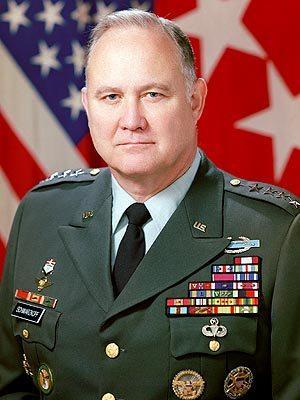Sorry Folks a bit late on this. ~Steve~
Published December 28, 2012
FoxNews.com

Americans mourned a military legend after retired Gen. H. Norman Schwarzkopf died Thursday at age 78, leaving behind a legacy that most famously included driving Saddam Hussein’s forces out of Kuwait.
Schwarzkopf died, in Tampa, from complications from pneumonia. He was remembered not only for his impressive military record, but his intelligence, his modesty and his warmth and dedication to fellow servicemembers.
“His epitaph should read that he was a soldier who loved solders,” retired Gen. Bob Scales, who knew the late general, told Fox News.
Nicknamed “Stormin’ Norman,” Schwarzkopf went on after he retired to support various national causes and children’s charities while eschewing the spotlight and resisting efforts to draft him to run for political office.
He lived out a quiet retirement in Tampa, where he’d served his last military assignment and where an elementary school bearing his name is testament to his standing in the community.
Schwarzkopf capped an illustrious military career by commanding the U.S.-led international coalition that drove Hussein’s forces out of Kuwait in 1991 — but he’d managed to keep a low profile in the public debate over the second Gulf War against Iraq, saying at one point that he doubted victory would be as easy as the White House and the Pentagon predicted.
Former President H.W. Bush, who has been in an intensive care unit in Texas, called the general a “distinguished member of that Long Gray Line hailing from West Point.”
“General Norm Schwarzkopf, to me, epitomized the ‘duty, service, country’ creed that has defended our freedom and seen this great Nation through our most trying international crises. More than that, he was a good and decent man — and a dear friend,” Bush said.
President Obama described Schwarzkopf as an “American original.”
“From his decorated service in Vietnam to the historic liberation of Kuwait and his leadership of United States Central Command, General Schwarzkopf stood tall for the country and Army he loved,” Obama said in a statement.
Schwarzkopf was named commander in chief of U.S. Central Command at Tampa’s MacDill Air Force Base in 1988, overseeing the headquarters for U.S. military and security concerns in nearly two dozen countries stretching across the Middle East to Afghanistan and the rest of central Asia, plus Pakistan.
When Saddam invaded Kuwait two years later to punish it for allegedly stealing Iraqi oil reserves, Schwarzkopf commanded Operation Desert Storm, the coalition of some 30 countries organized by President George H.W. Bush that succeeded in driving the Iraqis out.
At the peak of his postwar national celebrity, Schwarzkopf — a self-proclaimed political independent — rejected suggestions that he run for office, and remained far more private than other generals, although he did serve briefly as a military commentator for NBC.
While focused primarily on charitable enterprises in his later years, he campaigned for President George W. Bush in 2000, but was ambivalent about the 2003 invasion of Iraq. In early 2003 he told The Washington Post that the outcome was an unknown: “What is postwar Iraq going to look like, with the Kurds and the Sunnis and the Shiites? That’s a huge question, to my mind. It really should be part of the overall campaign plan.”
Initially Schwarzkopf had endorsed the invasion, saying he was convinced that Secretary of State Colin Powell had given the United Nations powerful evidence of Iraqi weapons of mass destruction. After that proved false, he said decisions to go to war should depend on what U.N. weapons inspectors found.
He seldom spoke up during the conflict, but in late 2004 he sharply criticized Defense Secretary Donald H. Rumsfeld and the Pentagon for mistakes that included erroneous judgments about Iraq and inadequate training for Army reservists sent there.
“In the final analysis I think we are behind schedule. … I don’t think we counted on it turning into jihad (holy war),” he said in an NBC interview.
Schwarzkopf was born Aug. 24, 1934, in Trenton, N.J., where his father, Col. H. Norman Schwarzkopf Jr., founder and commander of the New Jersey State Police, was then leading the investigation of the Lindbergh kidnap case. That investigation ended with the arrest and 1936 execution of German-born carpenter Richard Hauptmann for murdering famed aviator Charles Lindbergh’s infant son.
REST OF STORY HERE

